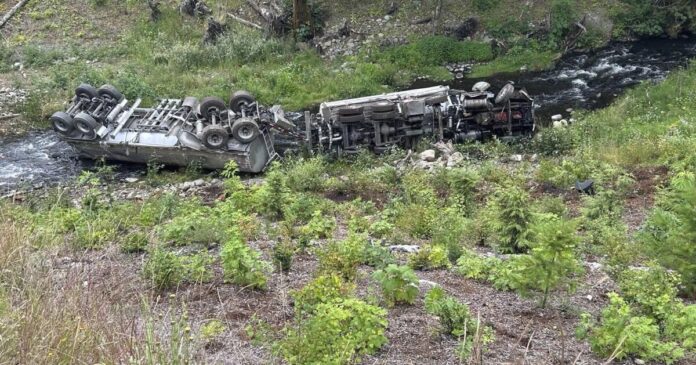"Environmental Crisis: Tanker Truck Spill Threatens Salmon Habitat on Olympic Peninsula"
Cleanup Efforts Underway After Fuel Spill in Washington’s Olympic Peninsula
Port Angeles, WA — Cleanup crews are actively working to contain a significant petroleum spill that occurred following a tanker truck accident on Friday, which has raised serious environmental concerns for local ecosystems. The incident took place on U.S. 101, west of Port Angeles, when the truck flipped upside down, spilling an estimated 3,000 gallons of gasoline and diesel into Indian Creek, a tributary of the Elwha River known for its fragile salmon habitat.
Incident Overview
According to the Washington State Department of Ecology, the crash resulted in a substantial leak of fuel into Indian Creek, which has been the focus of restoration efforts aimed at revitalizing salmon runs. The creek is part of a larger ecosystem that has seen significant recovery since the removal of two dams on the Elwha River over a decade ago, a project championed by the Lower Elwha Klallam Tribe.
The truck was successfully removed from the creek by Saturday morning, and U.S. 101, which had been closed overnight due to the accident, has since reopened. However, the cause of the crash remains under investigation.
Environmental Impact and Response
In response to the spill, the Lower Elwha Klallam Tribe has initiated shoreline assessments to evaluate the environmental impact on the creek and its surrounding habitats. The Department of Health is also involved, collecting water samples for further analysis to determine the extent of contamination.
“Monitoring efforts are crucial at this stage,” stated a spokesperson from the Department of Ecology. “We are particularly concerned about the potential effects on salmon populations and the broader ecosystem.”
Officials have reported that air quality levels in the vicinity of the spill are currently within safe limits, but residents are advised to remain vigilant for symptoms such as headaches or dizziness, which could indicate exposure to fumes.
Community and Government Response
Washington Governor Bob Ferguson described the incident as “devastating,” emphasizing the spill’s impact on local tribes and communities that depend on clean waterways for their livelihoods. “This spill is nothing short of heartbreaking for local tribes and other Washingtonians who rely on clean, healthy rivers and streams for their food and livelihoods,” he stated. Ferguson plans to visit the site in the coming days to assess the situation firsthand.
The city of Port Angeles has temporarily shut down its water treatment processing operations as a precautionary measure, urging residents and businesses to limit water usage. “The City’s reservoirs currently have sufficient water supply for the next 18 to 24 hours without interruption to normal service,” the city announced in a statement.
Historical Context
The Elwha River, which flows from Olympic National Park into the Strait of Juan de Fuca, has been the focus of extensive ecological restoration efforts. The removal of the two dams, completed in 2014, was a landmark achievement for the Lower Elwha Klallam Tribe, opening up approximately 70 miles of habitat for salmon and steelhead. Biologists have indicated that while it may take a generation for the river to fully recover, salmon have already begun to recolonize areas that had been inaccessible for over a century.
Conclusion
As cleanup efforts continue, the focus remains on mitigating the environmental impact of the spill and ensuring the safety of local residents. The situation is being closely monitored by state and tribal officials, with updates expected as assessments progress. The incident serves as a stark reminder of the vulnerabilities faced by fragile ecosystems and the communities that depend on them.
